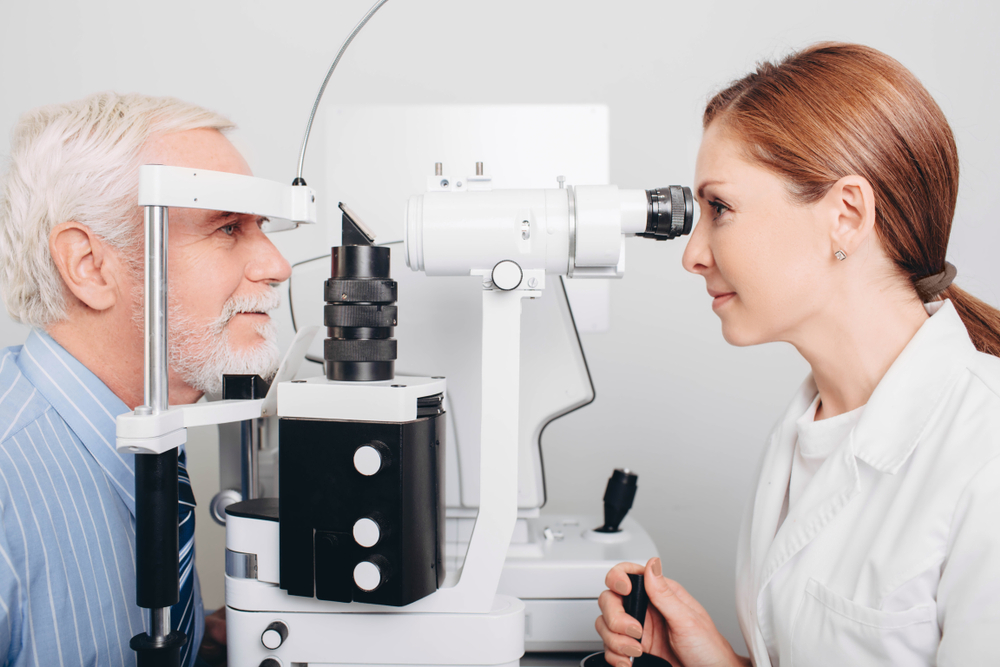What Does an Optometrist Do?
January 16, 2024
When someone uses the term "eye doctor," they could be talking about an optometrist, but they could also be talking about an ophthalmologist. These two kinds of eye doctors are often confused with one another.
You're not alone if you're confused or unclear about what makes someone an optometrist rather than an ophthalmologist. However, optometry and ophthalmology are separate professions, although they overlap.
Most people who see an eye doctor regularly to stay updated with their glasses and contact lens prescriptions and to keep their eyes healthy may see an optometrist. So, what does an optometrist do, and how does it differ from what ophthalmologists do? Keep reading to learn more about what optometrists do!
What is Optometry?
Optometry is a healthcare field that focuses on examining the eye and its structures to diagnose and treat abnormalities. Primarily, this means optometrists examine your eyes and test your vision.
The most common abnormality they can diagnose and treat is refractive errors. These include nearsightedness, farsightedness, and astigmatism.
The most common treatment for refractive errors is corrective lenses, either in the form of glasses or contact lenses. Optometrists can measure your refractive error to determine your glasses or contact lens prescription.
Additionally, optometrists can screen for various eye diseases and medical conditions relating to the eyes. They may also be able to prescribe medication for certain minor conditions.
But for the most part, if they find evidence that you may have an eye disease, they must refer you to an ophthalmologist for treatment. Optometrists hold a doctorate, so they're referred to as doctors.
But this is not a medical degree; it's a doctorate of optometry or OD. To receive an OD, optometrists must complete a four-year undergraduate degree and then four years of optometry school.
This education gives them the training they need to be primary care for most patients' eye health. But, some patients require help from an ophthalmologist as well.
Optometry vs. Ophthalmology
 Like optometrists, ophthalmologists are eye specialists. But they are also doctors with a medical degree, or MD, from an accredited medical school.
Like optometrists, ophthalmologists are eye specialists. But they are also doctors with a medical degree, or MD, from an accredited medical school.
To become an ophthalmologist, you must complete a four-year undergraduate degree, four years of medical school, at least one year of internship, and at least three years of a residency program.
That all adds up to a minimum of 12 years of training instead of the eight years required for optometrists. Ophthalmologists are qualified to do many things optometrists can, like measuring your visual acuity and determining a glasses or contact lens prescription.
But they can provide much more extensive testing and treatment for eye diseases. They're experts in eye diseases that optometrists can only screen for.
Most notably, ophthalmologists can perform eye procedures. Ophthalmologists perform all kinds of procedures on the eye, from laser vision correction procedures like LASIK to treating cataracts, glaucoma, retina diseases, and other eye conditions.
Still, optometrists are just as crucial as ophthalmologists in many ways, primarily because they often serve as most patients' primary eye healthcare providers.
Do You Need an Eye Exam?
Schedule a General Eye Care Appointment
Why Should You See an Optometrist?
If your eyes are healthy and you don't have any eye conditions beyond a refractive error, you should see an optometrist regularly. Optometrists can update your prescription and screen you for eye conditions like cataracts and glaucoma.
Most people with healthy eyes only need someone to make sure their eyes stay healthy, and their vision is as it should be. Ophthalmologists are experts in eye disease.
If you don't have any pre-existing eye conditions requiring treatment, you can likely continue to see an optometrist instead of an ophthalmologist. Some people need to see an ophthalmologist regularly, but optometrists are an excellent primary point of care to keep your eyes healthy.
They also work together regularly with ophthalmologists to ensure their patients get the necessary care.
Optometrists and Ophthalmologists Work Together
Here's a way you can think of the relationship between optometrists and ophthalmologists:
When keeping your body healthy, seeing your primary care physician for regular check-ups is essential. Most people see a primary care provider for these appointments, who may be a family physician.
These physicians can attend to most healthy patients' needs by examining their whole body and addressing any questions or concerns that patients may have. But if they find signs that some part of the body may be unhealthy, they'll refer their patient to a specialist.
If they have heart problems, they'll refer them to a cardiologist. If there are digestion issues, they may refer them to a gastroenterologist.
Referring patients to specialists ensures they get the care they need when their primary care physician can no longer provide the necessary care. Optometrists are like your family physician.
 Ophthalmologists are the specialists who can examine any issue your optometrists may pick up on more closely and give you appropriate treatment. But for the most part, ophthalmologists are the only kind of specialist an optician refers patients to, so they often work together.
Ophthalmologists are the specialists who can examine any issue your optometrists may pick up on more closely and give you appropriate treatment. But for the most part, ophthalmologists are the only kind of specialist an optician refers patients to, so they often work together.
Most optometrists even have a specific ophthalmologist or ophthalmology practice that they refer patients to and work with regularly. Unless you're concerned you may have a serious eye disease or condition, an optometrist is an excellent choice as a primary eye care provider!
Are you ready to make your eyes a priority? Take the first step by requesting a general eye care appointment with the team at Maryland Eye Associates in Prince Frederick, MD, today! Isn't it time to see the beautiful world around you with clarity?



